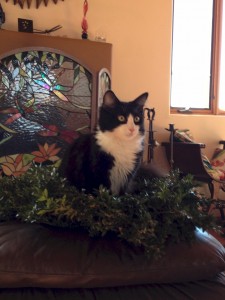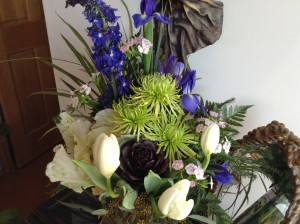 We brought home this fresh boxwood wreath to hang on the front door and Jackson immediately inserted himself in it. For those keeping score at home, he’s just shy of eight months old now.
We brought home this fresh boxwood wreath to hang on the front door and Jackson immediately inserted himself in it. For those keeping score at home, he’s just shy of eight months old now.
He’s going to be a Big Kitty.
I’m looking forward to the holiday season this year. I have ideas for decorating and even a cool homemade gift for people. I take this to mean that I’m feeling rested and the creativity is flowing. Part of this, I’ve suddenly realized, is because I changed some of my fundamental habits. What’s more is, I change a bad, lifelong habit without really realizing it.
Which is just extraordinary to me.
It’s *hard* to change habits – we all know this. Especially the bad ones. Those junk foods we crave but shouldn’t eat. That wine we shouldn’t drink nearly so much of. The TV shows we waste time on. The internet surfing when we should be working. I imagine each of us could list our top five bad habits – and then write a book on how many times we’ve tried to change them, how and why it ended up not working. (Because if it worked, it wouldn’t still be on the top five list, right?)
So, here’s one of mine: I’m a procrastinator.
Always have been. Back in school, I was the kid who wrote EVERY paper the night before it was due. I never studied until the day before the exam. (Well, the entire weekend in college for brutal classes like organic chemistry.) I once read the Iliad and the Odyssey over a couple of days during reading week before finals. Even with work, I don’t really get going on a deliverable until the deadline was breathing down my neck.
Deadline stress was my eternal motivator.
Which is awful. If you’re like me, you know just how stress-inducing this Very Bad Habit is. The late nights, the great fear that you won’t finish in time or that, if you do finish, the product will sucketh mightily.
I’ve known this about myself pretty much all my life and just hate it. And yet, over and over again, I would fall into the same pattern. Always dealing with the next fire, the next emergency. I always kind of envied the work-ahead people, but never found a way to break this habit.
Until just recently.
You know what worked? I didn’t change that particular habit, I changed other things that just happened to result in me at long last not relying on deadline pressure for motivation.
It’s like I tricked myself into operating differently. Isn’t that amazing?
I’m amazed.
So, what happened is, I had a number of writing deadlines. One was external – my first ever turn-in-your-book-by-this-date publication deadline, which I was determined not to blow – and several internal deadlines, important to me for keeping everything on track.I really, really, really did not want to be finishing that book the night before the deadline. I could not risk that it wouldn’t be as good as I needed it to be. No shortcuts, no crossing fingers, no Hail Mary’s. I wanted lots of time to get it done and get it done right.
So I planned out all my work. I finished another project that I wanted out of the way, to clear time for the one with the external deadline. I planned my dayjob work so that nothing would actually catch on fire enough to divert me. I worked in both measured paces and intense doses, depending on my time and inclination.
This was the amazing part.
I finished both projects early. Like, 7-10 days early. I’ve *never* finished anything early before in my life. Bizarrely, everything else fell into place, too. I’d wanted everything done before Thanksgiving, so I could relax and not worry about ongoing projects. I finished all my day job work by early afternoon Monday – where usually I’m working into the evening before we leave, trying to clear my desk.
At that point, I realized I had nothing on fire. Nothing that I was leaving undone.
It was miraculous.
I’d somehow learned to do my work ahead of time, in an un-stressed, no-deadline-pressure way, all because I’d restructured my other habits.
Now those of you who’ve followed my blog for a while know that I’ve long been a proponent of writing every day. I have my rituals, my good and productive habits. This overall change in my pattern of behavior grew out of that foundation. I suspect that’s key – I didn’t change everything overnight.
But I also think it’s important that I never tried to stop being a procrastinator. I changed the way I work towards a goal.
And that has made all the difference.
(with apologies to Robert Frost)
 This is our artichoke plant. The one that I was warned would lose its artichokes to admittedly gorgeous blossoms if we let it go too long. We (obviously) let it go too long.
This is our artichoke plant. The one that I was warned would lose its artichokes to admittedly gorgeous blossoms if we let it go too long. We (obviously) let it go too long. 







